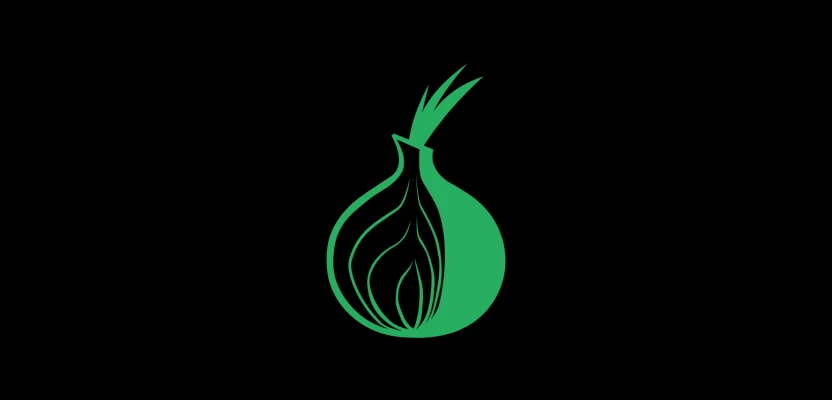
The hidden web, often referred to as the dark web, operates within a specialized framework requiring specific tools for access. Within this realm, onion links are prevalent, and traditional browsers such as Chrome, Firefox, Edge, or Safari are ineffective. The Tor browser emerges as the most suitable tool, offering the ability to explore noteworthy sites on the dark web while ensuring anonymity through the rerouting of traffic across multiple nodes.
This article aims to delve into the realm of dark web catalogs, shedding light on their intricacies and functionality.
Layers of the Internet
The Internet is broadly categorized into three segments based on the accessibility of information:
Clear Web or Surface Web
This encompasses the publicly accessible web pages that most individuals are familiar with. These pages are readily indexed by search engines, forming the visible layer of the Internet.
Deep Web
The Deep Web comprises sections of the Internet that are concealed from public view but not necessarily associated with malicious activities. For instance, personal email accounts reside in the Deep Web, as search engines do not index them, yet they are fully accessible. Additionally, certain platforms like Marketing SaaS (Software as a Service) operate within the deep web, necessitating authentication for accessing data. Surprisingly, a significant 96% of the Internet falls within the realm of the Deep Web.
Dark Web
Within the Deep Web exists the Dark Web, intentionally obscured and securely hidden from conventional visibility. Anonymity is a crucial aspect of the Dark Web, fostering an environment where criminal activities are more prevalent. This hidden corner of the web serves as a marketplace for breached data, illicit transactions, and the trade of illegal media.
Onion sites and their functionality

Onion sites, commonly known as Tor sites, represent a unique facet of the internet accessible exclusively through the dark web. These websites cannot be accessed using standard browsers, requiring the use of specialized tools such as Tor. Identified by the domain extension .onion, as opposed to the conventional .com or .net, onion sites reside in the hidden depths of the deep web, utilizing Tor to encrypt connections for enhanced user and creator anonymity.
The operational mechanism of onion sites involves a series of intricate steps. When attempting to connect to a .onion website, your internet traffic undergoes a circuitous route, bouncing through three random servers before reaching the intended destination. This multistep process, aptly named The Onion Router, adds layers of encryption at each server, contributing to the nomenclature of Tor links associated with dark web sites.
The journey of your data involves at least three distinct hops:
Entry Node
The entry node, inevitably privy to your IP address, marks the starting point of your data's journey.
Middle (or Relay) Node
Positioned between the entry and exit nodes, the middle node serves to obscure the entry node, preventing the exit node from determining its origin. This layering makes it challenging to correlate information about your connection.
Exit Node
The exit node, aware of the destination site but unaware of your identity, finalizes the journey. This separation of your IP address from the destination enables secure communication between two parties without revealing their identities to each other or any intermediary.
Best Clearnet onion catalogs
Though the dark web is infamous for hosting all manner of illicit content—dark web marketplaces for buying personal information, illegal drugs, gore sites, and worse—there are plenty of legitimate sites and services available if you know where to look.
1. Deepweb
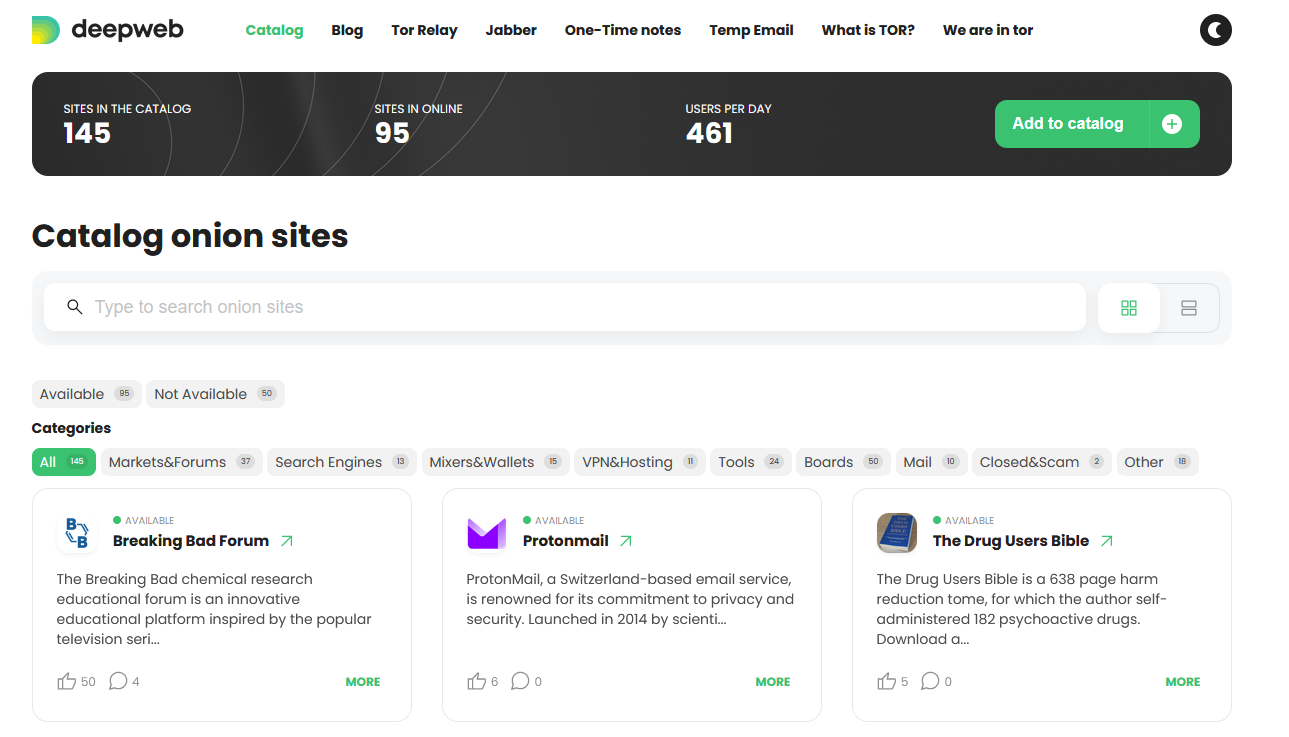
Direct link: https://deepweb.net/
Website serves as a centralized platform for deep web enthusiasts. It offers news, deep web website catalogues, and practical tools designed to improve the overall online experience for users.
Deepweb's news section provides users with the content relevant to the deep web community. It aims to keep users informed about the latest developments within this niche. Also Deepweb hosts comprehensive catalogues of deep web websites, ensuring users stay abreast of the evolving landscape within this online space.
The site presents such categories as:
- Markets & Forums (37)
- Search Engines (13)
- Mixers & Wallets (15)
- VPN & Hosting (11)
- Tools (24)
- Boards (50)
- Mail (10)
- Closed & Scam (2)
- Other (18)
Deepweb offers practical web features to enhance users' online interactions. These include: Jabber Account Creation, Temporary Mail, One-Time Notes.
With an emphasis on transparency, user-friendly design, and practical features, Deepweb serves as a valuable resource for individuals navigating the complexities of the deep web.
2. The Hidden Wiki
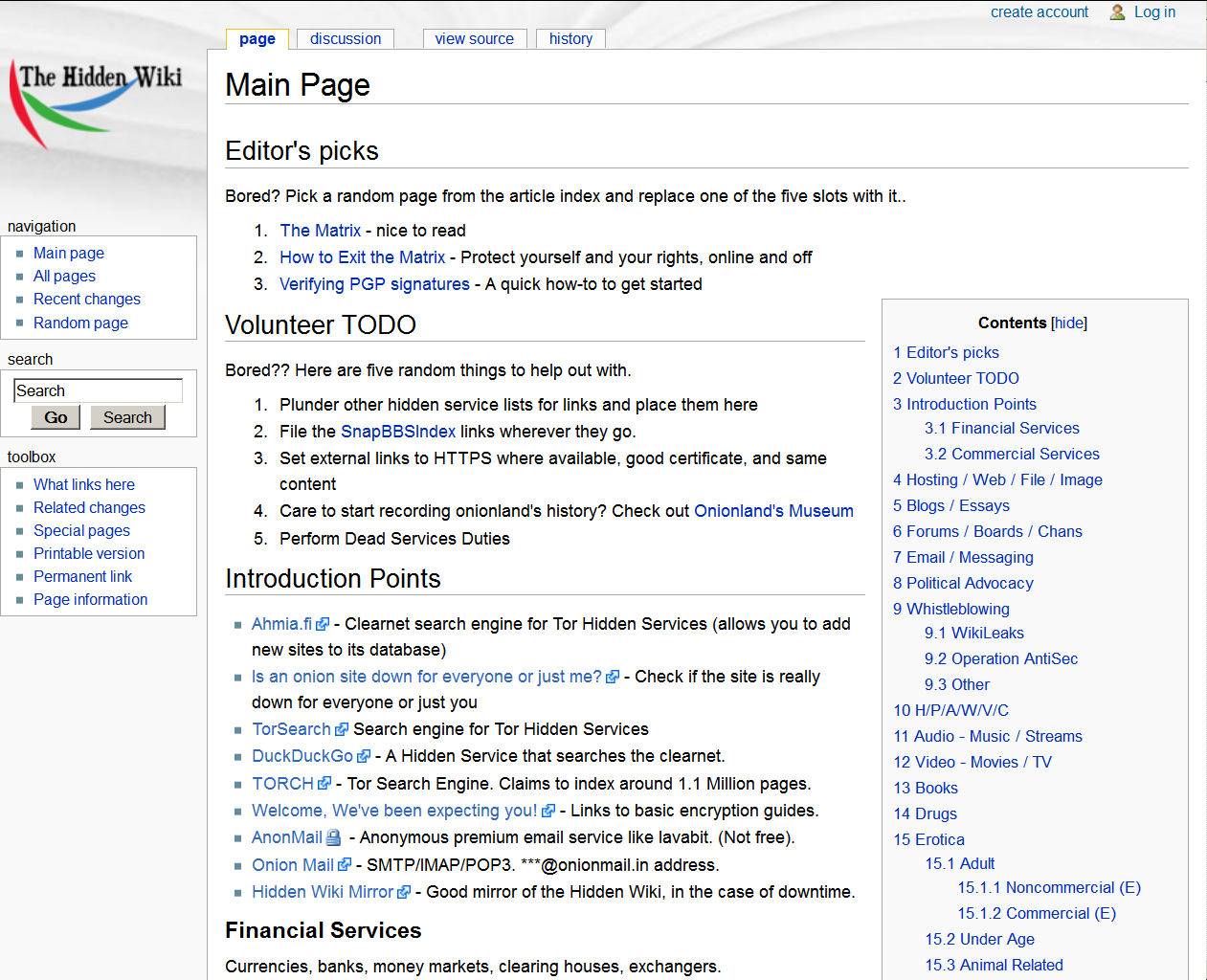
Direct link: https://thehiddenwiki.com/
For those embarking on the exploration of the dark web, the Hidden Wiki stands out as a valuable starting point. Often regarded as the dark web's equivalent of Wikipedia, it houses an extensive links directory, offering access to a myriad of content and services through .onion links.
However, caution is paramount when navigating the Hidden Wiki. Given its inclusive approach in maintaining a wide array of websites, users must exercise discretion to avoid unintended exposure to unwanted or inappropriate content. Notably, the Hidden Wiki has gained notoriety for hosting objectionable sites, including those associated with illegal activities.
The popularity of the Hidden Wiki has spawned numerous imitations. Users should exercise vigilance, as encountering different versions claiming authenticity is not uncommon. It is imperative to tread carefully, distinguishing the genuine Hidden Wiki from potential copycats to ensure a secure and informed exploration of the dark web.
3. Onion Links
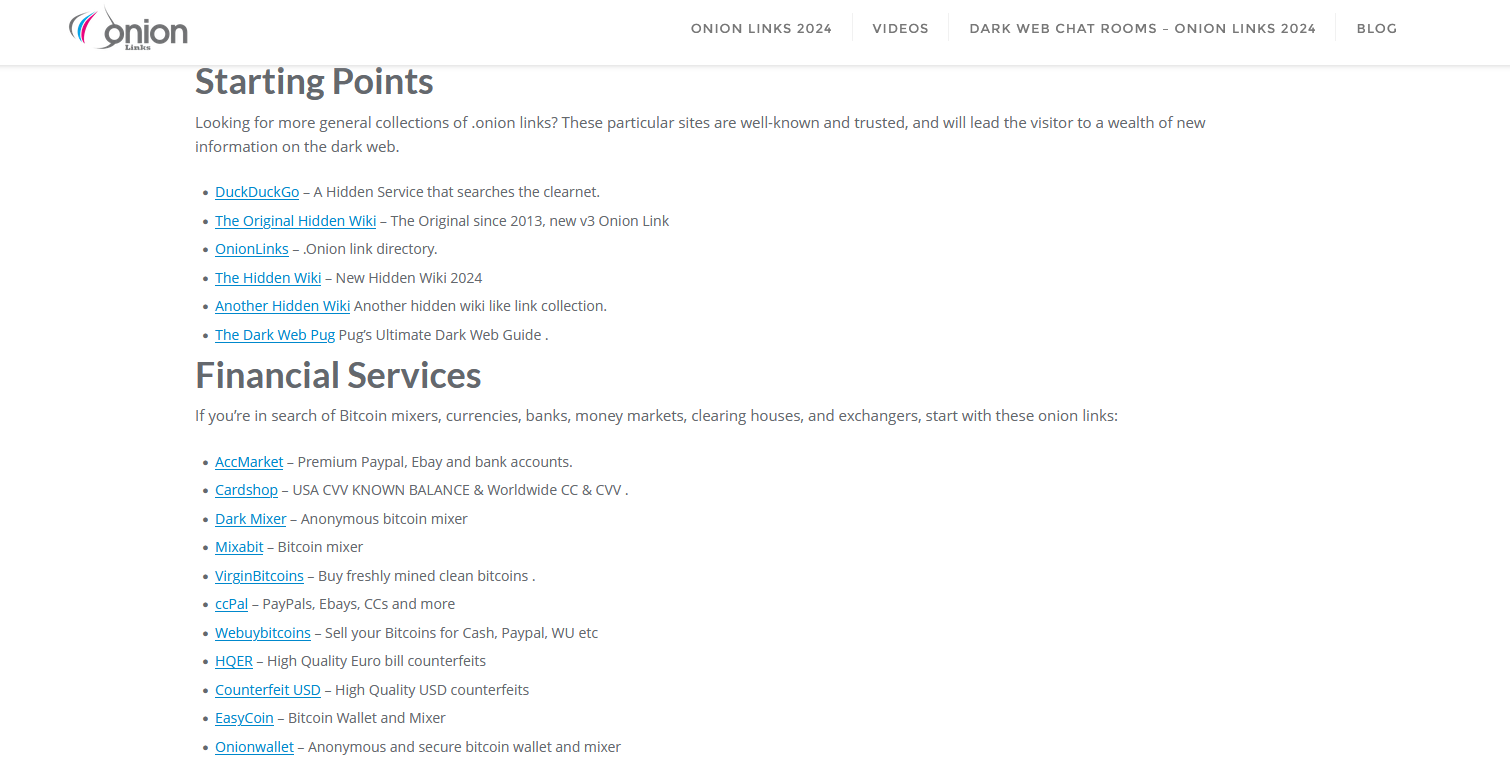
Direct link: https://onionlinks.com/
Focused exclusively on the new v3 .onion links for 2024, this platform offers a curated selection of working links within the realm of hidden service domain names. Whether you choose to navigate through the Tor or Tails browser, Onion Links assures a secure exploration of the dark web.
The reputation of Onion Links is, however, a mixed bag due to the unfortunate misuse of similar platforms by criminal entities, dodgy marketplaces, and hacker groups. The association has led to a perception that the dark web, including .onion links, attracts troubled individuals in society. While it's undeniable that some criminals operate within this space, it's essential to recognize that not all .onion links harbor questionable content. In fact, within these platforms, valuable services, forums for expressing views, and opportunities to learn ethical hacking abound.
4. Tor.Link

Direct link: https://tor.link/
Tor.Link distinguishes itself from conventional search engines by maintaining a vigilant check on the uptime status of search results. This commitment ensures that users are presented with only relevant and accessible pages, eliminating the need for link aggregators or uptime checking services. Unlike other darknet search engines, Tor.Link goes beyond publicly available pages and links provided by site operators, with crawlers capable of bypassing certain captchas and login pages.
The implementation of the OMG standard on Tor.Link introduces a mandatory PGP check before redirecting users to search results. This innovative approach aims to prevent phishing links from infiltrating the database, addressing a longstanding issue that has plagued link aggregators for years.
Privacy is a top priority for Tor.Link, as the platform does not collect any private information or log users' search history. All pages are rendered in plain HTML without any Javascript, ensuring seamless functionality within the Tor Browser.
Tor.Link operates on a free and accessible model, allowing users to access its listing and indexing services without any charges. The platform strongly believes in open-source software/intelligence, regularly updating and making its database publicly accessible to maintain transparency and neutrality in providing relevant results to user queries.
It is essential to note that Tor.Link explicitly disclaims responsibility for illegal content hosted on the darknet and/or any misuse of its public free services. Run by FOSS (Free and Open Source Software) developers as a non-profit community project, Tor.Link is not affiliated with torproject.org. However, it aligns with the principles of the torproject and its community.
5. Real World Onion Sites
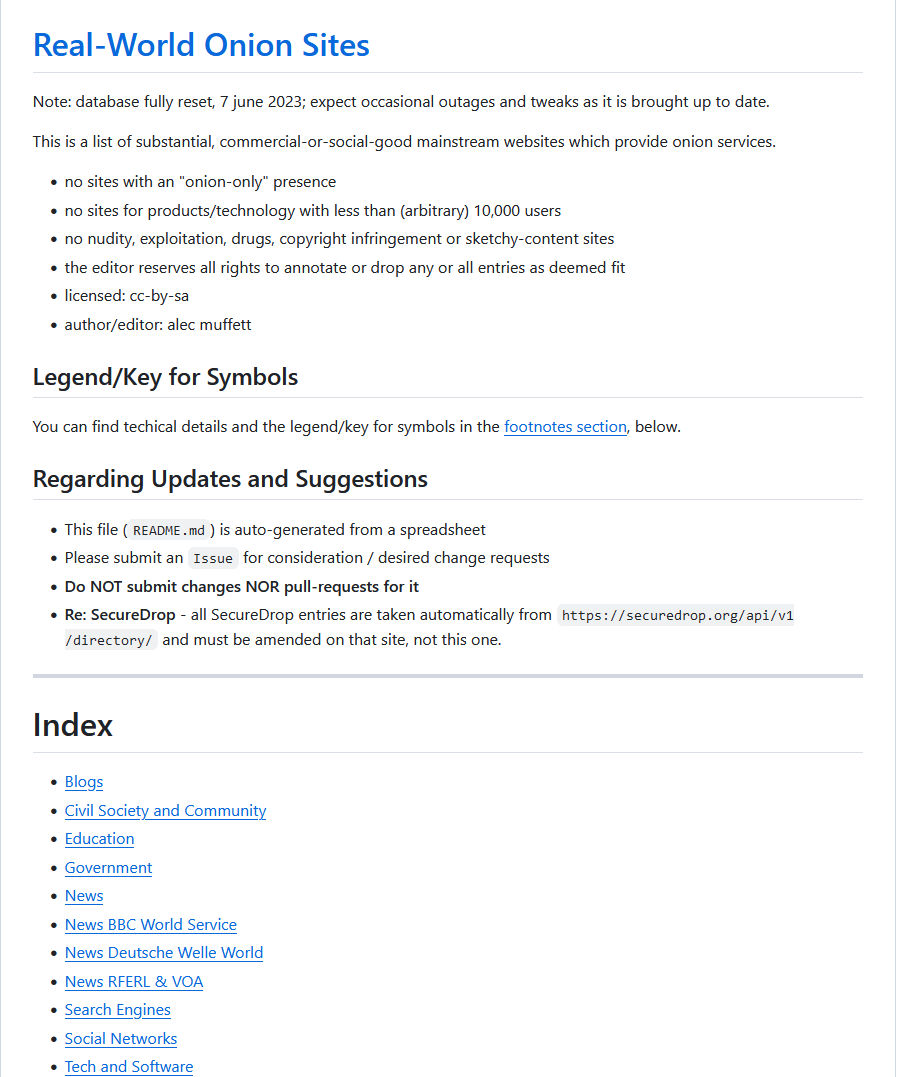
Direct link: https://github.com/alecmuffett/real-world-onion-sites
The Real World Onion Sites Github stands as a dependable and frequently updated repository, offering a meticulously curated list of active onion sites. This comprehensive listing encompasses a diverse array of services, providing users with links to a plethora of practical and legitimate platforms within the dark web.
Diverging from the norm observed in many onion search engines and listings, Real World Onion Sites distinguishes itself by intentionally excluding links associated with the darker aspects of the dark web. Instead, its focus is on steering users towards valuable and utilitarian services. Examples include onion addresses for reputable news outlets like BBC News, privacy-centric platforms such as Privacy International, and various other technology and news sources.
This platform prides itself on being a reliable resource that users can trust to navigate the dark web without stumbling upon illicit or harmful content. The commitment to excluding links to the darker side of the dark web positions Real World Onion Sites as a go-to directory for individuals seeking practical and legitimate services within this unique online space.
6. Dark.Fail
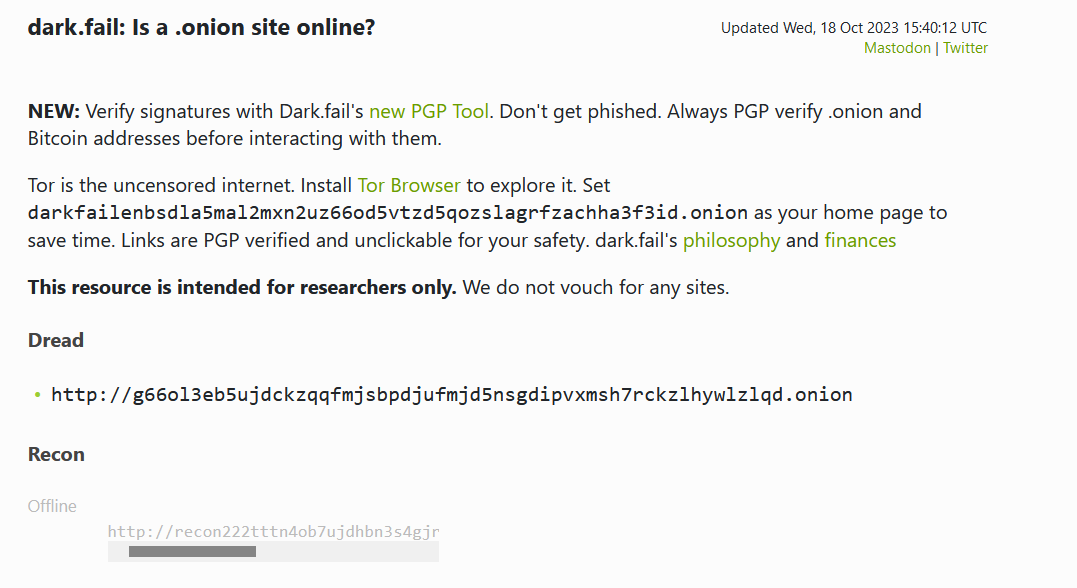
Direct link: https://darknet.fail/
Darkfail stands as a unique online platform that acts as a repository of links to hidden services sites within the darknet. Accessible through the Tor browser, Darkfail is hosted on both the clearnet and darknet, serving as a pivotal "bridge" between the surface web and the intricacies of the dark web. Over the years, it has earned a notable reputation as one of the most-respected sources for navigating the complexities of the darknet.
Administered by an anonymous privacy advocate, Darkfail positions itself as a service catering to cybersecurity researchers keen on monitoring darknet site uptime. Despite its primary focus on darknet markets, Darkfail also provides links to other sites and valuable darknet resources, contributing to its status as a comprehensive guide within the dark web landscape.
Trust plays a significant role in the darknet, and Darkfail operates on a trust-based model where users rely on the website to present legitimate links. The administrator, however, is widely regarded as highly trustworthy, contributing to Darkfail's positive reputation throughout its years of existence. The platform's administrator maintains an active presence on Twitter, offering a channel for users to stay updated and connected.
While Darkfail has maintained a strong reputation, it experienced a unique incident in April 2021 when its servers were compromised in a social engineering hack. During this event, a "man in the middle" attack occurred, resulting in the replacement of all links with phishing links. This occurrence, though isolated, underscores the importance of vigilance. To address any doubts, users are encouraged to check Darkfail's Twitter page for real-time updates and information.
Conclusion
Experienced users of the darknet often share a straightforward piece of advice: be skeptical and don't take everything at face value. There's a considerable amount of speculation and exaggeration surrounding the Tor darknet, and most of it doesn't hold true. Even if it does, it's often better not to delve too deep into it.
It's crucial to keep in mind that every click on an active onion site link could potentially lead to a phishing site. With minimal protection against scams and phishing, it's unwise to click on every onion link or copy and paste every onion address you come across. The consequences of such actions could be unfavorable.
In the Tor darknet, where misinformation is prevalent, exercising caution is essential. Resist the temptation to explore every unknown link, and adopt a prudent approach to online navigation. The principle of "trust, but verify" holds significance here, emphasizing the need for discretion and skepticism to safeguard personal security and privacy. In the Tor darknet, wisdom lies in recognizing the boundaries of curiosity and approaching exploration with a measured and cautious mindset.





Comments 0